Video: Polish villagers hold Jewish wedding without Jews
Fake wedding held in Radzanów to help modern-day Poles reconnect with their village’s lost Jewish heritage
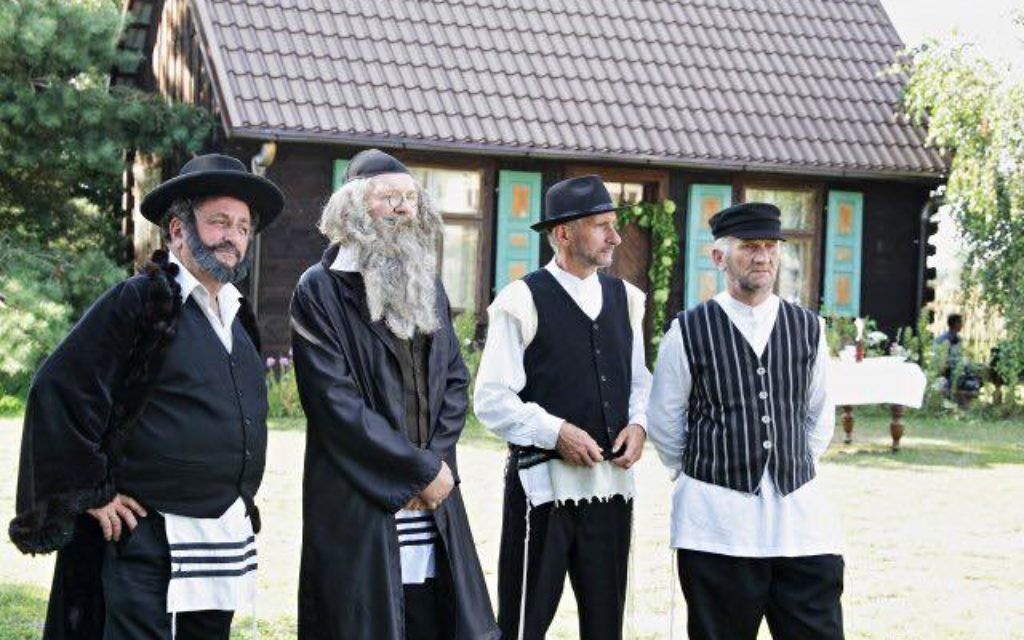
Nostalgia for Jews is a well-documented phenomenon in Eastern Europe, with cultural and even substantial commercial aspects.
In Ukraine, so-called Jewish-themed restaurants with pork-heavy menus compete for tourists, while figurines of Jews are sold at markets as good luck charms. In Poland, graffiti reading “I miss you, Jew” have become a common sight.
Beyond the kitsch, Jewish cultural festivals draw large non-Jewish audiences in Krakow, Warsaw and Budapest.
Get The Jewish News Daily Edition by email and never miss our top stories Free Sign Up
Some credit this trend to a feeling of loss over the near annihilation of once-vibrant Jewish communities. Others trace it a desire to reconnect with the pre-Soviet past.
But even against this backdrop, the fake Jewish wedding that was held Saturday in the village of Radzanów, 80 miles northeast of Warsaw, stands out as a remarkable affair.
Make-believe Jewish weddings — a regular educational event in Spain and Portugal, where nostalgia for nearly-extinct Jewish communities is also prevalent — are rare in Poland (locals in the village of Bobowa organised one in 2013). Even rarer are enactments as well-produced as the one in Radzanow.
Organised by the Radzanovia Association, a cultural group promoting Polish heritage, the event featured a few dozen non-Jewish volunteers, men and women, dressed in traditional Charedi costumes.
Some men wore fake beards and side curls – including ones that didn’t match their natural hair colour.
Portraying the groom was Piotr Czaplicki, a journalist for the Radia dla Ciebie station. Czaplicki, who is not Jewish, got under a chuppah – the canopy used in traditional Jewish weddings — together with his make-believe bride, Julia Brzezińska, a local resident. They were “wed” by a fake rabbi in a show before villagers, whom the event’s organisers sought to teach about Jewish traditions.
To Jonny Daniels, the London-born founder of From the Depths, which promotes Holocaust commemoration in Poland, events like the one in Radzanów are “some kind of therapy taking place all over the country.”
Speaking to Jewish News, Daniels said: “Today in Poland we are seeing a very interesting nostalgia connected to Polish Jewish relations, with some kind of therapy taking place all over the country, with literally hundreds of Jewish cultural festivals taking place, more often than not with no Jews involved. Poland too has the highest rate of hebrew language studies in all of Europe.”
“I truly believe that the 3rd and 4th generation of poles since the Holocaust are starting to see how much Jewish culture is part of modern day Polish culture, it’s amazing that this heritage created by 3.5 million murdered Jews is still relevant today.”
-
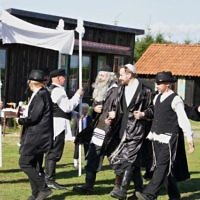
- Polish village dresses up for imitation ‘Jewish Wedding’ in Radzanów, Poland 2017 (Photo credit: Jonny Daniels, From The Depths)
-

- Polish village dresses up for imitation ‘Jewish Wedding’ in Radzanów, Poland 2017 (Photo credit: Jonny Daniels, From The Depths)
-
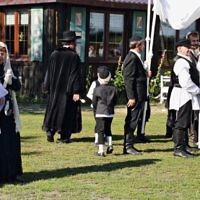
- Polish village dresses up for imitation ‘Jewish Wedding’ in Radzanów, Poland 2017 (Photo credit: Jonny Daniels, From The Depths)
-

- Polish village dresses up for imitation ‘Jewish Wedding’ in Radzanów, Poland 2017 (Photo credit: Jonny Daniels, From The Depths)
-
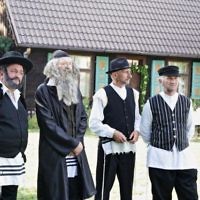
- Polish village dresses up for imitation ‘Jewish Wedding’ in Radzanów, Poland 2017 (Photo credit: Jonny Daniels, From The Depths)
-
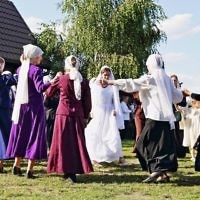
- Polish village dresses up for imitation ‘Jewish Wedding’ in Radzanów, Poland 2017 (Photo credit: Jonny Daniels, From The Depths)
But the event’s producer, Agnieszka Rychcik-Nowakowska, sees it as a way of commemorating the hundreds of Jews who had accounted for approximately half of her village’s population before the Holocaust.
“We want to remember all those homes of all pre-war Jews, who lived a peaceful life punctuated by the rhythm of holidays, family celebrations and more mundane events,” she told the news site Nasza Mlawa.
Jews first settled in Radzanów in 1710, and at their peak numbered about 500. By September 1939, when the Germans took over, the population had dipped below 300. Nearly all who remained would be sent to the Mlawa ghetto, never to return.
“We remember those who lived here before us and entered the memory of our grandmothers and grandparents. It was so recently,” said Rychcik-Nowakowska.
Elsewhere in Europe, Jewish-themed festivals are more common , bringing together hundreds of participants. There too, Jewish-themed events are held in the absence of a living, breathing Jewish community thanks to nostalgia and a desire to generate tourism revenue.
But in Spain and Portugal, for example, where hundreds of thousands of Jews were oppressed 500 years ago during the Inquisition, the passage of time has made goodwill gestures toward Jews less complicated than in the east. In 2013, Spain and Portugal even passed laws granting citizenship to descendants of Sephardic Jews – a move whose generosity contrasts sharply with the refusal by Poland and other East European countries to offer even partial restitution for property that was stolen from Jewish communities.
At the fake wedding in Radzanów, organisers turned to Teresa Wrońska, an actress from the Jewish Theatre in Warsaw, to assure the wedding’s authenticity. She choreographed the entire affair — from the signing of the ketubah (the Jewish marriage contract) to the traditional Jewish music played by a band of locals and musicians from the capital.
Even the POLIN Jewish museum of Warsaw was consulted in staging the event, according to Nasza Mlawa.
The wedding is not the only attempt by Radzanów locals to reconnect with their village’s lost Jewish heritage. Last year, a high school student from the region, Cuba Balinski, initiated a project aimed at rededicating and reopening the village’s abandoned synagogue – a small but beautiful Moorish-style building that miraculously survived the Nazi occupation.
Balinski, who has secured the cooperation of the Foundation for the Preservation of Jewish Heritage in Poland for his project but is still looking for investors, is adamant about restoring the synagogue to a house of worship rather than having it turn into museum.
“If there is no Torah in the synagogue, than it is still just a building,” he told the news site Gosc Plocki. “But if we bring the holy book back, it will come back to life.”

Thank you for helping to make Jewish News the leading source of news and opinion for the UK Jewish community. Today we're asking for your invaluable help to continue putting our community first in everything we do.
For as little as £5 a month you can help sustain the vital work we do in celebrating and standing up for Jewish life in Britain.
Jewish News holds our community together and keeps us connected. Like a synagogue, it’s where people turn to feel part of something bigger. It also proudly shows the rest of Britain the vibrancy and rich culture of modern Jewish life.
You can make a quick and easy one-off or monthly contribution of £5, £10, £20 or any other sum you’re comfortable with.
100% of your donation will help us continue celebrating our community, in all its dynamic diversity...
Engaging
Being a community platform means so much more than producing a newspaper and website. One of our proudest roles is media partnering with our invaluable charities to amplify the outstanding work they do to help us all.
Celebrating
There’s no shortage of oys in the world but Jewish News takes every opportunity to celebrate the joys too, through projects like Night of Heroes, 40 Under 40 and other compelling countdowns that make the community kvell with pride.
Pioneering
In the first collaboration between media outlets from different faiths, Jewish News worked with British Muslim TV and Church Times to produce a list of young activists leading the way on interfaith understanding.
Campaigning
Royal Mail issued a stamp honouring Holocaust hero Sir Nicholas Winton after a Jewish News campaign attracted more than 100,000 backers. Jewish Newsalso produces special editions of the paper highlighting pressing issues including mental health and Holocaust remembrance.
Easy access
In an age when news is readily accessible, Jewish News provides high-quality content free online and offline, removing any financial barriers to connecting people.
Voice of our community to wider society
The Jewish News team regularly appears on TV, radio and on the pages of the national press to comment on stories about the Jewish community. Easy access to the paper on the streets of London also means Jewish News provides an invaluable window into the community for the country at large.
We hope you agree all this is worth preserving.
- Features
- News Features
- Polish
- Jewish Wedding
- Radzanów
- Poland
- Jonny Daniels
- From the Depths
- Krakow
- warsaw
- Budapest
- Bobowa
- Piotr Czaplicki
- Radia dla Ciebie
- Julia Brzezińska
- Jewish traditions
- Polish Jews
- Jews in Poland
- Europe
- European Jewry
- Agnieszka Rychcik-Nowakowska
- Mlawa ghetto
- Holocaust
- Nazi occupation of Poland
- Polish history
- Holocaust in Poland
- Polish News
- Poland News
- POLIN Jewish museum
- Portugal
- Germans
- Nasza Mlawa
- Foundation for the Preservation of Jewish Heritage In Poland:
- News
-
By Brigit Grant
-
By Laurent Vaughan - Senior Associate (Bishop & Sewell Solicitors)
-
By Laurent Vaughan - Senior Associate (Bishop & Sewell Solicitors)
-
By Laurent Vaughan - Senior Associate (Bishop & Sewell Solicitors)
-
By Laurent Vaughan - Senior Associate (Bishop & Sewell Solicitors)





















